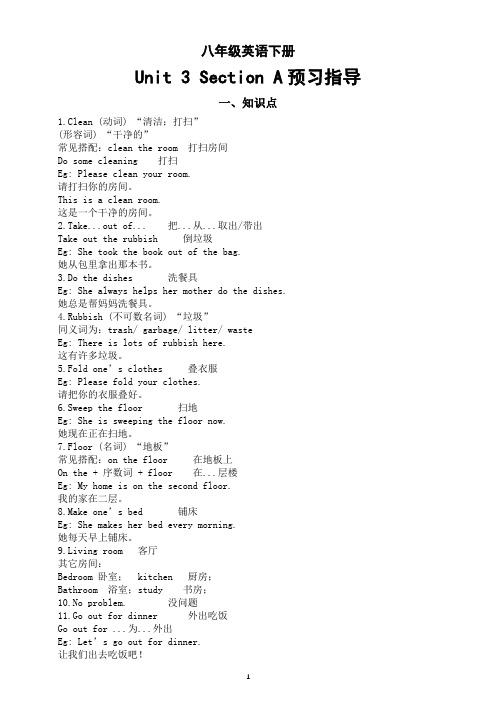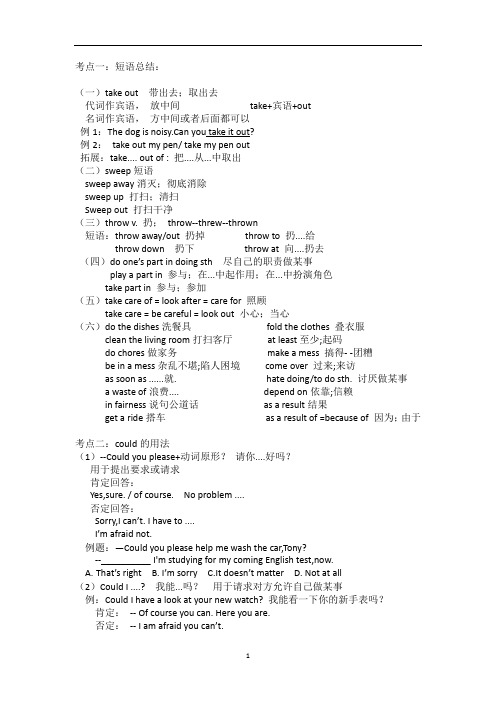八下unit3知识点
(完整版)八年级英语下册Unit3知识点总结Couldyoupleasecleanyourroom

Unit3 Could you please clean your room?Peter ,could you please take out the trash?彼得,你能把垃圾倒了吗?Could you please do sth ?请你(做)......好吗?用于提出恳求,希望获得对方的必定回答,说话的语气比较客气委宛。
Could不是can的过去式,是委宛、礼貌的说法。
回答用can.【常用答语】必定回答:Sure./ Of course./ Certainly./No problem.否认回答:Sorry , I can’t2、 take out取出(v+ adv)【注】 : 跟代词做宾语,代词放中间;跟名词做宾语,可放在中间,也可放在后边His teeth hurt badly. The dentist take them out .【短语】 take out the trash倒垃圾take a walk take back回收take place发生take off 3. Can you do the dishes.?那你能够洗盘子吗?do the dishes洗碗漫步脱下;take away腾飞拿走,取走【构造 1 】 do the + 名词:do the dishes/ laundry洗餐具/衣服【构造 2 】 do the + 动词 -ing do the cleaning打扫卫生【构造 3 】 do one ’ s +名词do one ’ s housework/ homework做家务/家庭作业【构造 4 】 do some + 动词 -ing do some reading/ shopping读写书/购物Could I at least finish watching this show?起码让我看完这个节目能够吗?1】 Could I do a sth?我能够做......吗?用于表达恳求,语气比较委宛。
Unit3 知识点人教版英语八年级下册

Unit 3Section A1.Peter,could you please take out the rubbish?(1) Could you please+动词原形?其否定形式是"Could you please+not+动词原形…?”。
肯定回答常用“Yes,sure./Sure. Certainly./Of course./ No problem/ With pleasure.”否定回答常用"I'm sorry, I can’t./Sorry, I can’t. /I’m afraid I can’t /I’m sorry, but...例Could you please hand out these books?Yes,sure./Sorry,I can’t. I have to sweep the floor.例题Could you please help me carry the heavy bag?A. It's a pleasureB. With pleasureC. You're welcomeD. It doesn’t matter(2)take out 带出去,取出,拔出,除掉动副短语Please take out a piece of paper. =Please take a piece of paper out.Please take it out.[拓展]take... out of...意为“把…从…取出/带出”。
Please take the books out of your schoolbag.(3) rubbish用作不可数名词,意为“垃圾;废弃物。
2 sweep the floor扫地(1) sweep( swept swept)此处用作及物动词,意为“扫;打扫”。
(2)floor用作可数名词,意为“地板”,通常指室内地面on the fl oor“在地板上”。
八年级(下)英语Unit3知识点,重点短语及句型

Unit3 What were you doing when the UFO arrived知识点:1.过去进行时表示在过去某一时刻或某个时间段内正在进行的动作,由“主语+was/were+动词的现在分词”构成。
2.arrive,reach与get(1)arrive是不及物动词,后跟名词时需用arrive in或arrive at。
(2)reach是及物动词,直接跟地点名词作宾语。
(3)get是不及物动词可以不跟宾语,需接宾语时用。
注意:arrive和get后接副词时,须省略介词at,in,to。
3.in front of与in the front of(1)in front of在…….的前面,指在这一事物的前面。
其反义词为behind,意为“在……后面”。
(2)in the front of在…….(范围内)的前面,指在这一事物内部的前面。
其反义词组为at the back of ,意为“在……(范围内)的后部”。
4.one…..the other, the other, others,the other(1.)one….the other指两者中的“一个,另一个”。
(2.)the others指“其余的”,表示在一个范围内的其他全部。
(3.)others与some对比使用,意为“有些”而不是“其他”。
(4.)the other是指其中的另一个5.happen to do sth. 碰巧做某事。
happen to sb. 某人发生了什么事。
6.everyday与every day(1)everyday是一个形容词,意为“每天的,日常的”只作定语,即用来修饰名词。
(2)every day则用作状语,意为“每天”。
7.shout at, shout to(1)shout at意为“向……喊\叫嚷\训斥”。
后接表示人的名词或代词,shout at有时表示训斥某人,含有恶意。
(2)shout to意为“向…..喊叫”,表示向某人大声喊叫以便让某人听见,不含恶意。
初中英语人教新目标八年级下册Unit 3 SectionA预习指导(知识点+练习题)

八年级英语下册Unit 3 Section A预习指导一、知识点1.Clean (动词) “清洁;打扫”(形容词) “干净的”常见搭配:clean the room 打扫房间Do some cleaning 打扫Eg: Please clean your room.请打扫你的房间。
This is a clean room.这是一个干净的房间。
2.Take...out of... 把...从...取出/带出Take out the rubbish 倒垃圾Eg: She took the book out of the bag.她从包里拿出那本书。
3.Do the dishes 洗餐具Eg: She always helps her mother do the dishes.她总是帮妈妈洗餐具。
4.Rubbish (不可数名词) “垃圾”同义词为:trash/ garbage/ litter/ wasteEg: There is lots of rubbish here.这有许多垃圾。
5.Fold one’s clothes 叠衣服Eg: Please fold your clothes.请把你的衣服叠好。
6.Sweep the floor 扫地Eg: She is sweeping the floor now.她现在正在扫地。
7.Floor (名词) “地板”常见搭配:on the floor 在地板上On the + 序数词 + floor 在...层楼Eg: My home is on the second floor.我的家在二层。
8.Make one’s bed 铺床Eg: She makes her bed every morning.她每天早上铺床。
9.Living room 客厅其它房间:Bedroom 卧室; kitchen 厨房;Bathroom 浴室;study 书房;10.No problem. 没问题11.Go out for dinner 外出吃饭Go out for ...为...外出Eg: Let’s go out for dinner.让我们出去吃饭吧!12.Go to the movies 去看电影类似词组:see the film 看电影Eg: They went to the movies last night.他们昨晚去看电影了。
八年级英语unit3知识点总结

八年级英语unit3知识点总结八年级英语Unit 3知识点总结Unit 3是八年级英语的重要单元,包括了现在进行时态、时间的表达方式和一些常见的动词短语等。
本文将就此进行总结,以供各位同学参考。
一、现在进行时态现在进行时态是指现在正在进行的动作或状态,它的构成是“be +现在分词”,be的形式根据主语在人称和数上变化。
例如:I am reading a book.Tom is playing basketball.They are listening to music.注意,在构成现在进行时态时,动词的变化是在现在分词上进行的。
动词的变化规则如下:1. -e结尾动词,去掉e加ing(例外:be去掉e后加ing)。
2. 重读闭音节词结尾,双写最后一个字母再加ing。
3. 以辅音字母+y结尾的动词,变y为i再加ing。
例如:love – lovingrun – runningget – getting二、时间的表达方式英语中有很多表达时间的方式,下面介绍一些常见的用法:1. at表示“在…时刻”,常用于表示某一具体的时刻。
例如:at six o’clock(在6点钟)at the weekend(在周末)2. in表示“在…期间”,常用于表示某一段时间和月份等。
例如:in the morning(在早晨)in the summer(在夏季)in May(在五月)3. on表示“在具体某一天”,和具体某一天相关的表示时间的形容词或名词后必须用on。
例如:on Monday(在周一)on the 12th(在12号)on New Year’s Day(在元旦)三、常见的动词短语1. go on表示“发生”,可以用于句子的主语为事情而非人的情况下。
例如:What’s going on here?(这里发生了什么事情?)2. take a break表示“休息”,常用于日常生活中。
例如:Let’s take a break.(我们休息一下吧。
人教版八年级英语下册Unit3短语归纳+重点考点总结

考点一:短语总结:(一)take out 带出去;取出去代词作宾语,放中间take+宾语+out名词作宾语,方中间或者后面都可以例1:The dog is noisy.Can you take it out?例2:take out my pen/ take my pen out拓展:take.... out of : 把....从...中取出(二)sweep短语sweep away消灭;彻底消除sweep up 打扫;清扫Sweep out 打扫干净(三)throw v. 扔;throw--threw--thrown短语:throw away/out 扔掉throw to 扔....给throw down 扔下throw at 向....扔去(四)do one’s part in doing sth 尽自己的职责做某事play a part in 参与;在...中起作用;在...中扮演角色take part in 参与;参加(五)take care of = look after = care for 照顾take care = be careful = look out 小心;当心(六)do the dishes洗餐具fold the clothes 叠衣服clean the living room打扫客厅at least至少;起码do chores做家务make a mess 搞得--团糟be in a mess杂乱不堪;陷人困境come over 过来;来访as soon as ......就. hate doing/to do sth. 讨厌做某事a waste of浪费.... depend on依靠;信赖in fairness说句公道话as a result结果get a ride搭车as a result of =because of 因为;由于考点二:could的用法(1)--Could you please+动词原形?请你....好吗?用于提出要求或请求肯定回答:Yes,sure. / of course. No problem ....否定回答:Sorry,I can’t. I have to ....I’m afraid not.例题:—Could you please help me wash the car,Tony?--__________ I'm studying for my coming English test,now.A.That’s rightB. I’m sorryC.It doesn’t matterD. Not at all(2)Could I ....? 我能...吗?用于请求对方允许自己做某事例:Could I have a look at your new watch? 我能看一下你的新手表吗?肯定:-- Of course you can. Here you are.否定:-- I am afraid you can’t.(3)表示能力Could表示过去的能力,can表示现在的能力can--couldCould you speak English then?那时候你会说英文吗?例题:1.-- ______you give me a hand? I can’t move the box by myself.-- No problem.A.CouldB. ShouldC.MustD. Need2.Li Ming_______speak two languages when he was eight years old.A.mayB. canC. can'tD. could考点三:1.复数名词(短语)作主语用法表示时间、重量、距离、价格等的复数名词(短语)作主语,谓语动词一般用单数形式ten minutes/ four thousand dollars ..做主语例题:For kids of this age, two hours of sitting in a classroom______too long.A.isB.areC. wasD.were考点四:For one week,she didn’t do any housework and neither didi I.(1)neither/nor +be动词/助动词/情态动词+主语结构“也不....’’ 注意:Me neither. 不能说Me nor.(2)作代词,"两者都不"neither of 结构作主语时,谓语动词用单数Neither of them has a car. 他们两个都没有汽车。
英语八年级下册unit3知识点

英语八年级下册unit3知识点英语八年级下册Unit3主要是涉及到旅游及热门景点相关内容。
在这一单元中,我们学习了许多关于出行的单词和词组,同时也学习了旅游方面的文化知识。
下面,本文将围绕这些知识点,总结归纳出本单元的核心知识点。
第一部分:旅游方面的单词和词组1. sightseeing:观光2. destination:目的地3. travel,journey:旅行4. tour:游览5. accommodation:住宿6. transportation:交通7. ticket:票8. guide:导游9. excursion:短途旅游我们应该注意这些单词的正确发音和用法,使自己的英语更加准确清晰。
第二部分:旅游方面的文化知识1. 美食文化:在旅游中品尝当地的美食也是很重要的一部分。
比如在中国,烤鸭和火锅就是很受外国人欢迎的美食。
在日本,则是寿司和生鱼片。
2. 交通文化:在不同国家,交通方式也是各不相同的。
比如在欧洲,大多数人选择步行或骑行,而在中国城市,公共交通比较发达,人们通常乘坐地铁、公交车等。
3. 饮食礼仪:在不同国家,饮食礼仪也是有所不同的。
比如在中国,用餐时要招待客人,避免用筷子顶餐盘等等礼仪问题。
在日本,则更注重吃饭时的细节和仪式感。
第三部分:热门景点在这个单元中我们还学习了关于热门景点的话题。
下面介绍一些世界著名热门景点。
1. 埃菲尔铁塔:法国巴黎的标志性建筑。
2. 自由女神像:位于美国纽约港口,是法国人向美国人赠送的礼物。
3. 金门大桥:连接美国旧金山和马林县,是世界上最著名的桥梁之一。
4. 罗马斗兽场:意大利罗马的古代竞技场,是世界历史上最著名的文化遗产之一。
5. 万里长城:中国的镇国之宝,是目前世界上保存最完好、规模最宏大的古代筑墙工程。
总结:英语八年级下册Unit3,主要涉及旅游方面的单词和词组、旅游方面的文化知识和世界著名热门景点。
我们可以通过学习这些知识点,提高我们的英语交流能力,也可以更好地了解和欣赏不同国家的风土人情。
八年级下册人教版U3知识点

八年级下册人教版U3知识点
本篇文章将为大家介绍八年级下册人教版U3知识点,主要包
括三个方面:地球的形状、地球的运动和地球的地理划分。
一、地球的形状
地球是一个略带扁球的球体,其极半径比赤道半径略小。
这种
形状被称为地球的地球形状,是由各种内外因素共同作用形成的。
目前,人们已经通过卫星观测、地球观测卫星、高空探险等多种
手段验证了地球的地球形状。
二、地球的运动
地球的运动主要包括自转和公转两种。
自转是地球以西偏北的北极轴为中心沿其自身的轴心进行的旋转。
自转的周期是23小时56分4秒,它引起了地球上昼夜交替、四季更替、风云变幻等现象。
公转是地球沿着一个椭圆形的轨道围绕太阳运行。
地球的公转周期为365.24日,决定了地球四季变化的规律。
三、地球的地理划分
地球的地理划分主要包括纬度和经度。
纬度指的是从赤道到地球两极的线条,按照经纬度来分,地球共被划分为90个纬度带,0度为赤道。
经度指的是垂直于赤道的线条,分别向东西方向延伸。
经度以一度为单位,沿着赤道划分,从0度开始,东经为正数,西经为负数,一圈共360度。
除此之外,地球还被划分为七大洲和五大洋,在人类的生活和探索中占据了重要地位。
总之,八年级下册人教版U3知识点涉及到地球形状、地球运动和地球的地理划分三方面,这些知识点是理解地球奥秘和探索地球资源的基础。
- 1、下载文档前请自行甄别文档内容的完整性,平台不提供额外的编辑、内容补充、找答案等附加服务。
- 2、"仅部分预览"的文档,不可在线预览部分如存在完整性等问题,可反馈申请退款(可完整预览的文档不适用该条件!)。
- 3、如文档侵犯您的权益,请联系客服反馈,我们会尽快为您处理(人工客服工作时间:9:00-18:30)。
Unit3 Could you please clean your room?知识点讲一讲1(section A)1.peter, could you please take out the rubbish? 彼得,请你去倒一下垃圾好吗?2. could you please sweep the floor? 请你把地扫一下好吗?(1)Could +主语+please +动词原形+……?(=Could +主语+动词原形+……,please?)表示委婉地提出请求,意为“请……,好吗?”肯定回答:yes , sure / of course / certainly.否定回答:sorry, I can’t , I have to ……如:Could you please help me with my English ? =Could you help me with my English, please?请你帮助我学英语好吗?(2)take out :意为“带出去;取出”。
如:Take out the rubbish 把垃圾带出去即倒垃圾。
Please take out a piece of paper . 请把这张纸带出去。
Take …out :把……带出去。
如:my father is taking me out to go for a drive. 我的父亲将带我出去开车。
[拓展] 与take有关的短句take off脱掉;(飞机)起飞take place 发生take part in 参加take care of 照顾take after 与…相像it take sb sometimes to do sth 做某事花费某人一些时间。
如:it took me two hours to do my homework. 做家务花费我两个小时的时间。
(3)sweep the floor :意为“扫地”与“家务劳动”有关的短语:Take out the rubbish / trash 倒垃圾fold one’s clothes 叠衣服Clean the room 打扫房间make one’s the bed 铺床Do the dishes 洗餐具do the laundry 洗衣服Clean the floor 擦地板cook dinner 做饭3.you have to clean your room. 你不得不打扫你的房间。
(1)have to 表示“不得不”,而must 侧重于个人的主观意志。
如:did she have to pay a fine ? 她不得不交罚款吗?I must go there to help the poor. 我必须去那儿帮助那些穷人们。
4. I threw down my bag and went to the living room . 我扔下我的包,去客厅了。
(1)throw 意为“扔;掷”,过去式为threw;throw down 意为“扔下”。
如:I threw down the money and went out . 我扔下钱走了。
5. could I use your computer ? 我能用你的电脑吗?Sorry, I’m going to work on it now. 对不起,我现在打算用它工作。
(1)work on : 从事;忙于;在(用)……工作。
如:he has worked on his company for ten years. 他在他的公司工作十年了。
My brother works on writing 我的哥哥从事写作。
练一练11. — Could you please clean the room?— _____ I have to do my homework.A. Yes, sure.B. Why not?C. Sorry, you can’t.D. Sorry, I can’t.2. — Could I please ______?—Sorry, you can’t. Your mother has to use it.A. do choresB. go to the moviesC. use the carD. go to school3.— Mum, Could I go to Beijing with you?—Yes, ________. But you have to finish your homework first.A. you canB. you couldC. yo u can’tD. you couldn’t4. —Would you like to come to my birthday party?—I’d love to, ___________I’m too busy.A. andB. ifC. soD. but5.---Could I borrow your dictionary?---Yes, of course, you____.A. mightB. willC. canD. should6. we the trash that you leave.A. take offB. take outC. take afterD. take place7. ---It’s hot today, isn’t it ?--- yes, it is , why not your jacket?A. take careB. take placeC. take afterD. take off8. It me an hour to learn English today.A. takeB. take careC. take offD. take place9.If your clothes are dirty ,you need to ______________.A. do the dishesB. fold your clothes B. do the laundry D. sweep the floor10. After the washed clothes are dry, you need to _______________A. make your the bedB. fold your clothes B. do the laundry D. sweep the floor11. I go to school by bus because my home is far from the school.A. mustB. have toC. had toD. has to12. I be there on time.A. have toB. mustC. needD. musn’t13. 放学后我扔下书包就出去玩。
After school I the bag and went out to play.14. 在学校我忙于读书没有时间打乒乓球。
At school I reading did not have time to play table tennis.15. he has the education for thirty years.A. worked onB. worked inC. worked upD. worked after讲一讲21.表示“请求”的句型还有:(1)would you mind doing……?你介意……吗?同意回答:No, not at all 没问题(不介意)不同意回答:yes, I do mind 是的,我介意如:Would you mind cleaning your room ? 你介意打扫你的房间吗?Would you mind my closing the windows? 你介意我关上窗户吗/?(2)Would you like to do sth? 你想做某事吗?如:would you like to come to my party? 你想参加我的聚会吗?Would you like to go boating ? 你想去划船吗?(3)can / may / could / might + 主语+动词原形……?……可以吗?如:can I go home now?我现在能去你家吗?May we ask you some questions ? 我们可以问一些问题吗?Could you tell me where the post office is ? 你能告诉我邮局在哪儿吗?2. Tony, Could you please help out with a few things ? 托尼,你能帮助处理几件事吗?(1)help out with 给予帮助。
如:My mom always asking me to help out with my little sister我的妈妈总是要求我帮助我的小妹妹。
3.you watch TV all the time and never help out around the house. 你总是看电视从来不帮助做家务。
(1)all the time=always 意为“一直;总是”。
[拓展] 与time 有关的短句at times 有时from time to time 有时;偶尔at the same time 同时in time 及时on time 按时at once= right now 立刻;马上如:we must be here on time 我们必须按时到这儿。
(2)any minute now 随时马上如:The guests are arriving any minute now but we are still not ready.客人马上就到但我们还没准备。
4. Could you please pass me the salt? 你能把盐递给我吗?(1)pass后可以接双宾语:pass sb sth=pass sth to sb 意为“把某物递给某人”如:the waiter passed me the food. = the waiter passed the food to me 服务员把食物递给了我。
(2)pass 意为“通过”。
如:you’ll have to work hard if you want to pass exam. 如果你想通过考试就得用功。
5. Could I at least finish watching this show? 我至少可以看完这个节目吗?I finished reading it last night. 我昨天晚上读完了。
